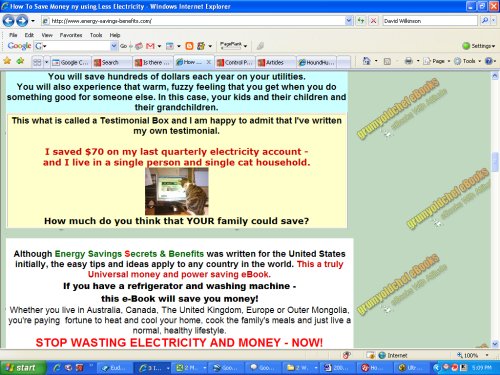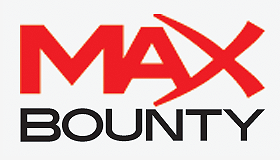You'll find the video about my affiliate marketing predictions for 2010 below, which, in case you didn't see them, references my affiliate marketing predictions for 2009.
Agree? Disagree? Tell me what you think!
Learn Blogging & Affiliate Marketing with Rosalind Gardner
Affiliate marketing is a revenue-sharing arrangement between online merchants and distributors (affiliates) in which the affiliate earns a commission.
You'll find the video about my affiliate marketing predictions for 2010 below, which, in case you didn't see them, references my affiliate marketing predictions for 2009.
Agree? Disagree? Tell me what you think!
 Are you a Clickbank merchant? Are your sales of digital information products or software dismal? Perhaps you haven't seen even one affiliate sale of your Clickbank product? Then listen up…
Are you a Clickbank merchant? Are your sales of digital information products or software dismal? Perhaps you haven't seen even one affiliate sale of your Clickbank product? Then listen up…
As a Super Affiliate I've visited a TON of Clickbank merchant sites over the years and of those that I review, only about 10% are worth promoting… and some of those I have to run direct to the order page.
Here are 15 things that you can do to get affiliates to promote your site and sell more of your products on Clickbank.
These are the most basic tips for selling more as a Clickbank merchant.
Get into Clickbank and check out your competition. Take a good look at why they are at top of their category page and have such a high gravity. Then, do your best to not only emulate their tactics, but do an even better job.
Clickbank Pirate is a program that is tailored for beginner and intermediate online marketers that is focused on getting you to your first $1,000 per month and then helping you grow from there.
If you’re not making $1,000 per month online passively, then Clickbank Pirate is something you may consider looking at.
Unlike many programs out there that simply teach you how to pick out an affiliate product, put up a website, and drive traffic, Clickbank Pirate really takes things to the next level by giving you access to tested campaigns that have already proven to convert and convert well.
With Clickbank Pirate, you get everything you need to be successful online:
On top of all of that, everything is hosted for you, so you can literally click a few buttons and be on your way to making money.
“Zilch, zip, nix, nada, nothing…”
In a NPT forum post entitled “Is This Odd?”, Kaycee reported:
“About 6 weeks ago, all of a sudden conversions from the one of those merchants completely tanked! Zilch, zip, nix, nada, nothing. I'm not doing anything different, links are working fine, their merchant account is active, nothing broken on their website that I can see and I'm still sending them more or less the same amount of traffic which is reflected in my Shareasale stats.”
Given those facts, my immediate assumption was that there was a problem at the merchant's checkout.
Sure enough, Kaycee discovered that affiliate commissions were NOT being tracked, and I suggested that Kaycee request to be compensated for lost commissions.
Kaycee's request was denied.
Some affiliate program managers will go one better and add a downtime ‘good faith' bonus as shown in the example below:
May 12, 2006 – Downtime compensation for May 11th
Late May 10th until very early May 11th, we came under a strong network attack. The total downtime lasted for approximately 3 hours, however all affiliates will be credited for 6 hours worth of time.
You should see the compensation amount, in the bonus column of your stats for May 11th. This amount is calculated by taking your average hourly earning for May, and multiplying it by 6.
We apologize for any inconvenience this may have caused you and thank you for your continued support and loyalty. If you have any questions, do not hesitate to contact your account rep.
Any merchant partner that does NOT compensate for downtime, especially downtime during which they continue to profit from traffic sent by affiliates, needs to be dumped.
Comments, questions or suggestions? Please leave a comment below!
Cheers,

This video might explain the reason…
For those who have watched the video, I only have 95 more to go…
 How do you convince Super Affiliates to promote your products?
How do you convince Super Affiliates to promote your products?Wooing a Super Affiliate over drinks and dinner with offers of significantly higher-than-advertised commission rates and exclusive landing pages will definitely get their attention.
And showering them with free product samples (especially if they're expensive) is fairly effective too.
However, wining and dining alone will not guarantee that the heavy hitters will join your program.
Even if your product is a fabulous fit for the affiliate's audience and your commission rates are more generous than your competitor's, no Super Affiliate will send copious amounts of targeted traffic (read their highly valued subscribers with whom they've worked hard to develop loyal and lasting relationships) to your site unless it first passes their Merchant Site Test.
I personally start with factors that will affect a visitors' experience, and keep the following questions in mind as I peruse a merchant's site for the first time.
Does the site load quickly or does the server bog down under graphic-laden pages? If there is a Flash homepage, is there an obvious ‘skip intro' link or am I forced to watch the video to the bitter end? Is the site attractive and professional in appearance or are there broken links, graphics, and scripting errors? Is the sales page comprehensive and well written; or is it fraught with spelling and grammatical errors or ‘holes' in the sales copy?
I also check to see whether the site uses excessive newsletter signup popups or advertising fly-ins. Do site preview popups such as Snap Shots block my view of the text each time I cursor over a link? Does a new window open every time I click a link? Although I may understand a merchant's motivation for using such tactics, I am more concerned that visitors to the site will find such intrusions confusing and/or annoying to the point that they are likely to exit the site and kill any chance of a sale.
Appearance, functionality and copy rarely pose problems with professionally designed and maintained sites. Nor are they an issue for Clickbank affiliates who can code links to send traffic directly to the order form.
However, having to bypass a merchant's homepage means that pay per click arbitrage isn't an option for some affiliates, while others will have to write sales copy rather than a product review. Although some affiliates may be willing to make that effort to promote one exceptional product, most will pass on the program if the merchant offers a diverse or large selection of goods.
Visitors must be able to search for and find what they want quickly and easily.
For example, does a clothing site let visitors drill-down to choose between designers, color and function; or does a click on the ‘Dresses' link slowly load a page that displays fifty thumbnails of cocktail, evening and wedding dresses?
If visitors can find products with ease, good affiliates will then confirm that the order process is functional, intuitive and secure.
What happens if our customer has questions about either the product or her order?
I'd be thrilled to see all except the last item on that list, as a prominently posted telephone number that encourages phone orders means that potential commissions will be lost through ‘traffic leakage'.
Affiliates that pay for traffic are particularly sensitive to this problem, and most affiliates will not join a merchant's affiliate program if there is any leakage at all.
Phone orders must therefore be tracked to the referring affiliate – which does not mean asking your customers from which site they originated. Merchants who aren't equipped with the technical wizardry to track phone orders should allow affiliates to send their traffic to a version of the site that does not post a phone number and trust that their Super Affiliates' promotional efforts will more than make up for any sales that may be lost by doing so.
Most traffic leaks occur when merchants link to other sites that may be of interest to their visitors or to partner sites with which they have reciprocal link agreements. Traffic leakage also occurs when a merchant with two or more online stores links to those other sites without compensating affiliates for sales from any and all of their stores.
The most offensive type of outbound link traffic leaks are affiliate or contextual advertising links (i.e. Google Adwords ads) from which the merchant hopes to profit. Most affiliates consider this practice more ‘traffic theft' than traffic leakage and will not only not join the program, they will also warn other affiliates of the merchant's commission-stealing practices.
Here is an example of one popular merchant that places advertising on their their sites… which is why I don't direct paid traffic to their review page on my blog.

That's not to say that as a merchant that you shouldn't promote other merchant's products.
You should.
But do it on the back end or from within the secure area of your site, only after your own affiliates have had a fair chance to earn a commission for sending traffic to your site.
As you can see, the Merchant Site Test is comprehensive and Super Affiliates are picky to the nth degree!
If any aspect of the site misses the bar, most Super Affiliates will go on to consider a competitor's offer and promote their products without so much as a TYBNTY (thank-you-but-no-thank-you) note for your time and treats.
And if you're lucky enough to have a Super Affiliate take time from their busy promotional schedule (or lounge chair) to explain why they've chosen not to join your program, consider implementing their recommendations as soon as possible – and let them know as soon as the changes have been made.
Visit a web developer's forum and ask for feedback about your site. Ask your site visitors for their comments and suggestions as well. Check the affiliate networks for clues about what your competitors are doing right. For example, ask yourself how a merchant that pays only 8 percent commissions have an EPC that is triple that of the merchant who pays 12 percent? Do your own Merchant Site Test to find out why affiliates love to promote their program.
Getting just one Super Affiliate on board can substantially increase a program's earnings.
The first Super Affiliate in a program will generally use this advantage to heavily advertise the site or product using pay-per-click.
As other Super Affiliates join the program and competition between affiliates increases, most will rise to the challenge and step up their promotional efforts using a diverse array of creative methods. Exposure to both the product and the affiliate program tend to increase exponentially at that point – which makes for very happy merchants and managers.
When you design your sales site with a view to building long-term relationships with your site visitors and potential Super Affiliates, you too can get that kind of happy – perhaps even rich.
This article was originally published in Revenue Magazine.
Comments, questions or suggestions? Please leave a comment below!
Cheers,

 Is your site ready for Christmas shoppers?
Is your site ready for Christmas shoppers?An Accenture survey forecasts that folks will be shopping for Christmas earlier this year, with 69 percent planning to complete the bulk of their holiday shopping by Dec. 7th. Too, consumers are more deal-oriented than ever before, with 25% of them expecting at least 50 percent discounts before they buy.
According to a Gallup survey, the Christmas spending forecast is down slightly this year, with consumers planning to spend $740 on gifts compared to $801 as per surveys taken at the same time last year.
With more merchants competing for fewer dollars, the deals are going to be phenomenal. In fact, merchants have already started to lower their prices to get a leg up on the competition.
Sears launched a campaign on October 31st, called “Black Friday Now” with deep discounts happening every Saturday from now until Christmas.
Saturdays???
‘Black Friday', which falls on the day after American Thanksgiving (November 27th) is the first day of the Christmas season and is usually the busiest shopping day of the year… offline.
‘Cyber Monday' is the Monday after Thanksgiving. The term was first used by Shop.org, whose research showed that 77% of online retailers reported a significant increase in sales on that day.
So what does that tell us?
That we'd better plan to get our affiliate sites and PPC campaigns ready for the Christmas shopping rush earlier than ever. I've noticed that folks are talking about Black Friday / Cyber Monday deals on consumer sites already. In fact,
So, although the big Christmas shopping days are still almost a month away, you need to get your site and PPC campaigns ramped up now.
Keep these suggestions in mind as you prepare your site for the 2009 holiday season – and you'll thank me for your increased conversions this year! 🙂
Comments, questions or suggestions? Please leave a comment below!
Cheers,

 Steven Sauve of MaxBounty today announced the affiliate network's new interface.
Steven Sauve of MaxBounty today announced the affiliate network's new interface.
I stopped by and indeed, not only is the whole site prettier, but functional enhancements for affiliates include the ability to set your own callback URL's as well as a “campaign quick searches” available at the top of every page.
Unfamiliar with MaxBounty? Here are a few facts:
Signup for a MaxBounty account today and you can be eligible for a $1000 performance bonus.